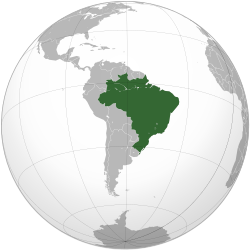
Back حقبة فارغاس Arabic Varqas dövrü Azerbaijani Ера на Варгас Bulgarian Era Vargas Catalan Era Vargas Spanish Era Vargas Galician ברזיל בתקופת ורגאס HE Era Vargas ID Era Vargas Italian Vargasa ēra Latvian/Lettish
This article has multiple issues. Please help improve it or discuss these issues on the talk page. (Learn how and when to remove these messages)
|
Republic of the United States of Brazil República dos Estados Unidos do Brasil | |||||||||
|---|---|---|---|---|---|---|---|---|---|
| 1930–1946 | |||||||||
| Motto: "Ordem e Progresso" "Order and Progress" | |||||||||
| Anthem: Hino Nacional Brasileiro (English: "Brazilian National Anthem") | |||||||||
 | |||||||||
| Capital | Rio de Janeiro | ||||||||
| Common languages | Portuguese | ||||||||
| Government | Federal provisional government (1930–1934)
Federal presidential republic (1934–1946)
| ||||||||
| President | |||||||||
• 1930 | Military Junta | ||||||||
• 1930–1945 | Getúlio Vargas | ||||||||
• 1945–1946 | José Linhares | ||||||||
| Historical era | Interwar period · World War II | ||||||||
| 3 October 1930 | |||||||||
| 16 July 1934 | |||||||||
| 23 November 1935 | |||||||||
| 10 November 1937 | |||||||||
| 22 August 1942 | |||||||||
| 24 October 1945 | |||||||||
| 29 October 1945 | |||||||||
| 18 September 1946 | |||||||||
| Currency | Brazilian real (1930–1942) Cruzeiro (1942–1946) | ||||||||
| |||||||||
The Vargas Era (Portuguese: Era Vargas; Portuguese pronunciation: [ˈɛɾɐ ˈvaʁɡɐs]) is the period in the history of Brazil between 1930 and 1946 when the country was governed by president Getúlio Vargas. The period from 1930 to 1937 is known as the Second Brazilian Republic, and the other part of Vargas Era, from 1937 until 1946 is known as the Third Brazilian Republic (or Estado Novo).
The Brazilian Revolution of 1930 marked the end of the First Brazilian Republic. The coup deposed President Washington Luís and blocked swearing-in of president-elect Júlio Prestes on the grounds that the election had been rigged by his supporters. The 1891 Constitution was abrogated, the National Congress dissolved, then the provisional military junta ceded power to Vargas. Federal intervention in state governments increased and the political landscape was altered by suppressing the traditional oligarchies of São Paulo and Minas Gerais states.
The Vargas Era comprises three successive phases:
- the period of the Provisional Government (1930–1934), when Vargas governed by decree as Head of the Provisional Government instituted by the revolution, pending the adoption of a new Constitution.
- the period of the Brazilian Constitution of 1934, when a new Constitution was drafted and approved by the Constituent Assembly of 1933–1934 and Vargas, elected by the Constituent Assembly under the transitional provisions of the Constitution, governed as president alongside a democratically elected legislature.
- the Estado Novo period (1937–1946) began when, in order to stay in power, Vargas imposed a new dictatorial Constitution in a coup d'état and shut down the Legislature to rule Brazil as a dictator.
The deposition of Getúlio Vargas and the Estado Novo regime in 1945 led to the subsequent re-democratization of Brazil with the adoption of a new Constitution in 1946, marking the end of the Vargas Era and the beginning of the Fourth Brazilian Republic.

